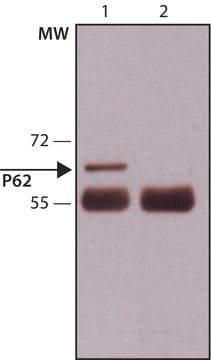Fontos dokumentumok
P0067
Anti-p62/SQSTM1 antibody produced in rabbit
~1 mg/mL, affinity isolated antibody, buffered aqueous solution
Szinonimák:
Anti-Sequestosome 1, Anti-Ubiquitin-binding p62
About This Item
Javasolt termékek
biológiai forrás
rabbit
Minőségi szint
konjugátum
unconjugated
antitest forma
affinity isolated antibody
antitest terméktípus
primary antibodies
klón
polyclonal
form
buffered aqueous solution
molekulatömeg
antigen ~62 kDa
faj reaktivitás
human, rat, mouse
kiszerelés
antibody small pack of 25 μL
koncentráció
~1 mg/mL
technika/technikák
immunoprecipitation (IP): 1-2 μg using lysate of NIH-3T3 cells
indirect immunofluorescence: 1-2 μg/mL using human A549 cells
western blot: 1-2 μg/mL using whole extracts of rat PC12 cells
UniProt elérési szám
kiszállítva
dry ice
tárolási hőmérséklet
−20°C
célzott transzláció utáni módosítás
unmodified
Géninformáció
human ... SQSTM1(8878)
mouse ... Sqstm1(18412)
rat ... Sqstm1(113894)
Általános leírás
Anti-p62/SQSTM1 is produced in rabbit using as immunogen a synthetic peptide corresponding to amino acids of human p62/SQSTM1 (GeneID: 8878), conjugated to KLH. The corresponding sequence is identical in rat and mouse. The antibody is affinity-purified using the immunizing peptide immobilized on agarose.
Egyediség
Immunogen
Alkalmazás
- western blotting
- immunoprecipitation in human cell lines
- Immunohistochemistry prostatectomy specimens
Biokémiai/fiziológiai hatások
Mutations in this gene result in sporadic and familial Paget disease of bone. p62 is commonly found in inclusion bodies containing polyubiquitinated protein aggregates, that accumulate in several degenerative diseases. Autophagy is involved in cellular clearance of these protein aggregates. Autophagy plays an essential role in cellular differentiation, cell death, and aging. Defective autophagy may contribute to certain human diseases such as cancer, neurodegenerative diseases, muscular disorders, and pathogen infections.
Fizikai forma
Tárolás és stabilitás
Egyéb megjegyzések
Jogi nyilatkozat
Nem találja a megfelelő terméket?
Próbálja ki a Termékválasztó eszköz. eszközt
Tárolási osztály kódja
10 - Combustible liquids
Lobbanási pont (F)
Not applicable
Lobbanási pont (C)
Not applicable
Egyéni védőeszköz
Eyeshields, Gloves, multi-purpose combination respirator cartridge (US)
Analitikai tanúsítványok (COA)
Analitikai tanúsítványok (COA) keresése a termék sarzs-/tételszámának megadásával. A sarzs- és tételszámok a termék címkéjén találhatók, a „Lot” vagy „Batch” szavak után.
Már rendelkezik ezzel a termékkel?
Az Ön által nemrégiben megvásárolt termékekre vonatkozó dokumentumokat a Dokumentumtárban találja.
Az ügyfelek ezeket is megtekintették
Tudóscsoportunk valamennyi kutatási területen rendelkezik tapasztalattal, beleértve az élettudományt, az anyagtudományt, a kémiai szintézist, a kromatográfiát, az analitikát és még sok más területet.
Lépjen kapcsolatba a szaktanácsadással














